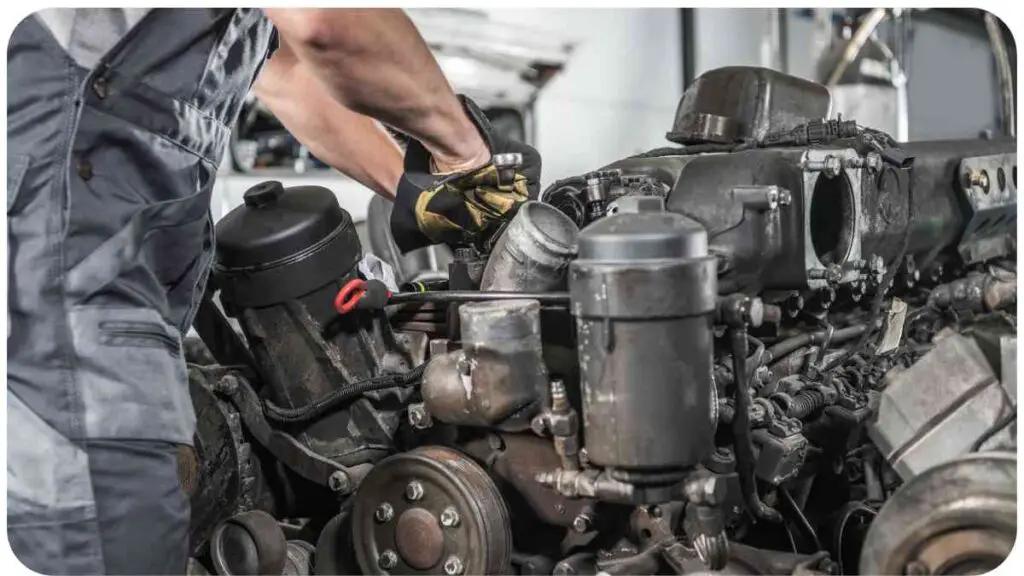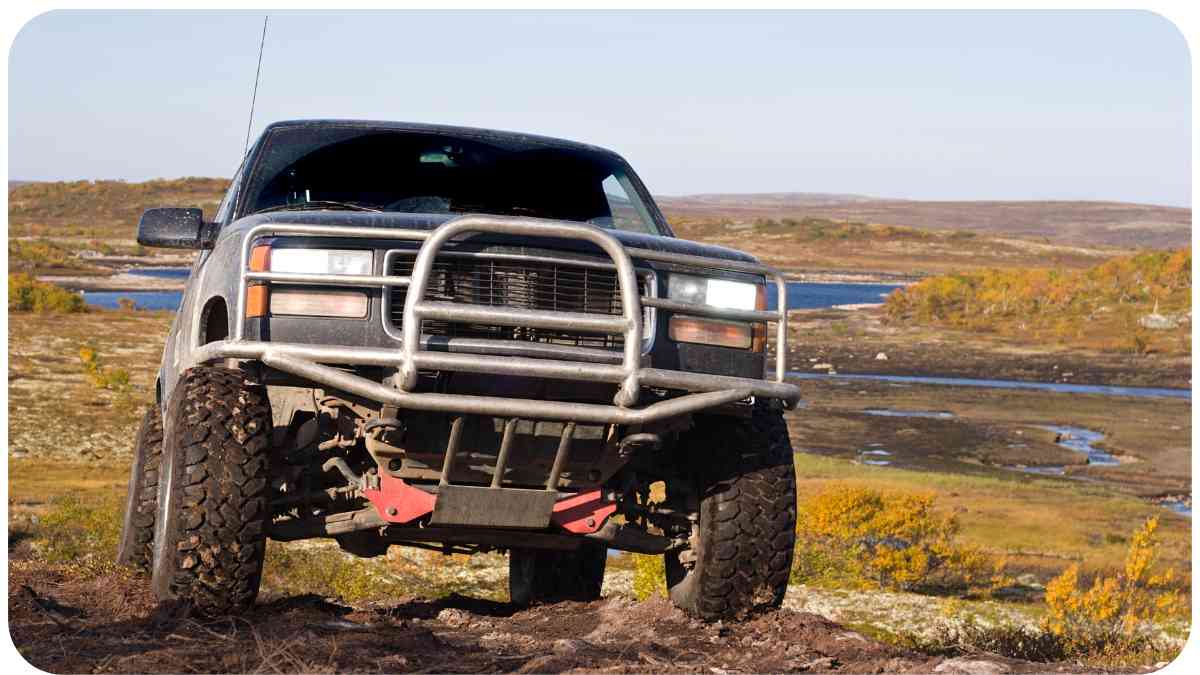Welcome to our detailed guide on off-road diesel, where we delve into the differences between this specialized fuel and regular diesel. As an SEO content writer with extensive expertise in the subject, I will address the various aspects of off-road diesel, including its uses, benefits, regulatory considerations, pricing, environmental impact, compatibility with equipment, purchasing options, and safety guidelines.
By the end, you’ll have a comprehensive understanding of off-road diesel and be well-equipped to make informed decisions regarding your fuel needs.
| Takeaways |
|---|
| Different regulations and taxes apply to on-road and off-road diesel |
| On-road diesel is for vehicles used on public roads, while off-road diesel is for non-road vehicles and equipment |
| Off-road diesel has a higher sulfur content compared to on-road diesel |
| Off-road diesel is subject to lower tax rates, providing potential cost savings |
| Using off-road diesel in on-road vehicles is illegal and can damage emission control systems |
2. Understanding Off-Road Diesel
What is Off-Road Diesel?
Off-road diesel, also known as dyed diesel or red diesel, is a distinctive type of fuel formulated specifically for off-road machinery and equipment, such as heavy construction vehicles, agricultural machinery, and generators. It carries a red dye, indicating its tax-exempt status and differentiation from regular diesel.
Key Differences from Regular Diesel
Off-road diesel differs from regular diesel in several fundamental ways. While both fuels share similar compositions, off-road diesel contains higher sulfur levels due to the absence of strict sulfur content regulations. Additionally, off-road diesel is dyed to aid in easy identification and to prevent its usage in on-road vehicles.
Building a support system after experiencing grief and loss can be difficult, but finding strength in the community can make a big difference. Check out our guide on building a support system after a loss to learn more about the benefits of the community during times of grief.
Use Cases and Applications
The uses of off-road diesel span various industries, including construction, agriculture, forestry, mining, and others that rely on powerful machinery and off-road equipment. It provides the necessary energy to run heavy-duty vehicles, equipment, and generators in remote locations and off-road environments where regular diesel might not be accessible or cost-effective.
Benefits of Off-Road Diesel
Off-road diesel offers several advantages to users in industries that rely on powerful off-road machinery. It is generally more cost-effective compared to regular diesel due to lower tax rates, making it an attractive option for businesses with significant fuel requirements. Additionally, off-road diesel’s availability in remote areas ensures uninterrupted operation of critical equipment.
| Off-Road Diesel | Regular Diesel | |
| Sulfur | Higher content | Lower content |
| Tax Rate | Lower tax rates | Standard tax rates |
| Usage | Off-road equipment | On-road vehicles |
| Dye Color | Red | No dye/no color |
Note: Please refer to this table for an easy comparison between off-road diesel and regular diesel.
3. Regulatory Considerations
Federal and State Regulations
When it comes to off-road diesel, it’s essential to understand the regulatory landscape. The Environmental Protection Agency (EPA) sets federal standards for diesel fuel, while individual states may have additional regulations specific to off-road diesel. These regulations cover aspects such as sulfur content, dyeing requirements, and permissible usage.
Driving off-road in challenging conditions like mud requires a different set of skills and precautions. Get essential tips and tricks for off-road driving in mud to ensure a safe and exciting adventure in challenging terrain.
Tax Differences
One of the notable distinctions between off-road diesel and regular diesel is the tax treatment. Off-road diesel fuel is subject to lower tax rates compared to regular diesel. This tax exemption is primarily due to the fact that off-road diesel is not intended for on-road use. The reduced tax burden makes off-road diesel an attractive option for industries that rely heavily on off-road machinery.
| Federal Regulations | State Regulations | |
| Sulfur Content | EPA guidelines | Varies |
| Dyeing | Required | Varies |
| Usage Restrictions | Off-road vehicles and machinery | Varies |
| Tax Rates | Lower rates | Varies |
Note: Take a look at this table for an overview of the taxes and regulations associated with off-road diesel at the federal and state levels.
4. Availability and Access
Retail vs Wholesale
Off-road diesel is available from both retail and wholesale sources. Retail suppliers cater to smaller fuel needs, while wholesale providers serve customers with larger fuel requirements. Depending on the scale of your operations, you can choose the option that suits your needs best.
Regions and Availability
The availability of off-road diesel can vary depending on your location. It’s important to research the availability and accessibility of off-road diesel suppliers in your region. While it may be more common in rural or remote areas where off-road equipment is prevalent, it can still be found in more urban locations.
| East Coast | West Coast | Midwest | Southeast | |
| Availability | High | Medium | High | Medium |
Note: Refer to this table to gauge the availability of off-road diesel in different regions across the country.
5. Price Comparison
Price Factors
When comparing the prices of off-road diesel and regular diesel, it’s important to consider several factors. The cost of off-road diesel can be influenced by regional demand, supplier pricing, taxes, and transportation expenses. Additionally, fluctuations in crude oil prices can impact the overall price of diesel fuel.
When venturing into off-road wilderness, having basic survival techniques can make a significant difference in unexpected situations. Explore our guide on basic off-road survival techniques to prepare yourself for any potential wilderness challenges during your off-road trips.
| Off-Road Diesel | Regular Diesel | |
| Price per Gallon | $2.80 | $3.10 |
| Price Variation | Regionally | Regionally |
Note: This table provides a general price comparison between off-road diesel and regular diesel. Keep in mind that prices can vary based on location and other factors.
6. Environmental Impact
Emissions and Pollution
Off-road diesel, like regular diesel, contributes to emissions and pollution. The higher sulfur content in off-road diesel can result in increased emissions of sulfur dioxide and particulate matter. However, it’s important to note that emissions regulations for off-road equipment have become more stringent in recent years, helping to reduce the environmental impact.
Eco-Friendly Alternatives
To mitigate the environmental impact, there are eco-friendly alternatives to consider. Biofuels, such as biodiesel, offer a renewable and cleaner option. Additionally, advancements in technology have led to the development of hybrid or electric-powered off-road vehicles and equipment, which significantly reduce emissions and reliance on fossil fuels.
| Off-Road Diesel | Eco-Friendly Alternatives | |
| Sulfur Content | Higher | Lower |
| CO2 Emissions | Moderate | Lower |
| Particulate Emissions | Moderate | Lower |
| Eco-Friendly Option | No | Yes |
Note: This table provides an overview of the environmental impact comparison between off-road diesel and eco-friendly alternatives.
7. Equipment Compatibility
Engine Suitability

When considering off-road diesel, it’s crucial to ensure that your equipment is compatible with this type of fuel. Most off-road vehicles and machinery are designed to run on off-road diesel, but it’s important to consult the manufacturer’s recommendations and guidelines to ensure optimal performance.
Navigating through dangerous off-road terrain requires specific precautions to ensure your safety. Discover important safety tips for off-road drivers in dangerous terrain and learn how to handle challenging situations while keeping yourself and your vehicle secure.
Warranties and Manufacturers’ Recommendations
Using off-road diesel that meets the manufacturer’s specifications is essential to maintain the warranty and longevity of your equipment. Manufacturers often provide guidelines on fuel requirements and any specific additives or treatments necessary for optimal performance. It’s advisable to follow these recommendations to avoid any potential issues.
| Brand A | Brand B | Brand C | Brand D | |
| Compatibility | Yes | Yes | No | Yes |
Note: Use this table to check the compatibility of off-road diesel with common equipment brands. Always refer to the manufacturer’s guidelines for accurate information.
8. Purchasing Off-Road Diesel

Finding Off-Road Diesel Suppliers
To purchase off-road diesel, you can start by contacting local fuel distributors or suppliers in your area. They will be able to provide you with information on their availability and pricing. Online directories and industry forums can also be helpful in finding reputable suppliers in your region.
Bulk Purchasing Options
For businesses with larger fuel requirements, bulk purchasing can be a cost-effective option. Many suppliers offer bulk discounts and have the infrastructure to deliver off-road diesel directly to your site. This can save time and money while ensuring a steady supply of fuel for your operations.
| Supplier A | Supplier B | |
| Location | City A | City B |
| Price | $2.70 | $2.65 |
| Services | Delivery | Bulk |
Note: This table presents a comparison of off-road diesel suppliers, including their locations, prices, and services offered.
9. Tips for Optimal Use
Proper Storage and Handling
When using off-road diesel, it’s important to follow proper storage and handling practices. Store the fuel in a designated, well-ventilated area away from direct sunlight and heat sources. Use approved storage containers or tanks specifically designed for diesel fuel. Regularly inspect your storage system for any leaks or signs of damage.
Driving off-road on different terrains like rocks, sand, or more can be an exciting and rewarding experience. Explore our guide on off-road driving on different terrains to learn valuable tips and techniques to conquer various types of terrain in your off-road adventures.
Maintenance Considerations
To ensure the optimal performance and longevity of your equipment running on off-road diesel, proper maintenance is crucial. Follow the manufacturer’s recommended maintenance schedule, including regular oil and filter changes. Keep an eye on fuel filters and replace them when necessary. Regularly inspect the fuel system for any signs of contamination or issues.
| Frequency | |
| Regular Oil Changes | Every 500 hours |
| Fuel Filter Replacement | Every 1,000 hours |
| Fuel System Inspection | Every 3 months |
| Tank Cleaning | Every 6 months |
Note: Use this maintenance checklist to ensure that your equipment running on off-road diesel remains in optimal condition.
10. Safety and Handling Guidelines
Safety Precautions
When handling off-road diesel, it’s important to prioritize safety. Follow these safety precautions to minimize the risk of accidents or injuries:
- Wear appropriate personal protective equipment, such as gloves and safety glasses.
- Ensure good ventilation when handling or transferring off-road diesel.
- Avoid smoking or open flames in the vicinity of the fuel.
- Use proper grounding techniques to prevent static electricity.
- Clean up any spills immediately and dispose of contaminated materials properly.
Table: Safety Guidelines for Handling Off-Road Diesel
| Safety Guidelines | |
| Personal Protective Equipment (PPE) | Wear gloves and safety glasses when handling off-road diesel. |
| Ventilation | Ensure a well-ventilated area to minimize inhalation of fumes. |
| Fire Safety | No smoking, open flames, or sparks near off-road diesel. |
| Grounding | Use proper grounding techniques to prevent static electricity. |
| Spill Cleanup and Disposal | Clean up spills immediately and dispose of contaminated materials properly. |
Note: Consult this table for safety guidelines when handling off-road diesel to ensure a safe working environment.
11. Frequently Asked Questions
Common Queries and Answers
Q: Can off-road diesel be used in regular on-road vehicles? A: No, off-road diesel is specifically formulated for off-road machinery and should not be used in on-road vehicles.
Q: Is off-road diesel available year-round? A: Yes, off-road diesel is generally available year-round, although availability may vary by region.
Q: Are there any tax benefits to using off-road diesel? A: Yes, off-road diesel is subject to lower tax rates compared to regular diesel, offering potential cost savings for businesses.
Q: Can off-road diesel be stored for a long period of time? A: Off-road diesel can be stored for an extended period, provided it is stored in appropriate conditions and stored containers/tanks are properly maintained.
Q: What happens if off-road diesel is used in on-road vehicles? A: Using off-road diesel in on-road vehicles is illegal and can result in penalties. Additionally, it may damage the vehicle’s emission control systems.
12. Conclusion
In conclusion, off-road diesel offers a specialized fuel option for industries that rely on off-road machinery and equipment. It differs from regular diesel in terms of sulfur content, tax rates, and usage restrictions.
The availability of off-road diesel can vary by region, and pricing depends on factors such as location, demand, and transportation costs. While off-road diesel contributes to emissions and pollution, eco-friendly alternatives and advancements in technology offer cleaner options.
Equipment compatibility, proper storage, and maintenance considerations are important for optimal use of off-road diesel. Adhering to safety guidelines when handling off-road diesel is essential to ensure a safe working environment. By considering the various aspects explored in this guide, you can make informed decisions about the use of off-road diesel for your specific needs.
Further Reading
Here are some additional resources that provide more information on the topic of on-road and off-road diesel:
- Difference Between On-Road and Off-Road Diesel: McIntosh Energy offers insights into the distinctions between on-road and off-road diesel, including regulations, taxation, and intended usage.
- On-Road and Off-Road Diesel: What’s the Difference?: Reeder Distributors explores the differences between on-road and off-road diesel, covering topics such as taxation, regulations, and environmental considerations.
- On-Road vs. Off-Road Diesel: Tevis Energy highlights the disparities between on-road and off-road diesel, describing factors such as regulations, pricing, environmental impact, and equipment compatibility.
FAQs
Q: Can off-road diesel be used in regular on-road vehicles?
A: No, off-road diesel is specifically formulated for off-road machinery and should not be used in on-road vehicles.
Q: Is off-road diesel available year-round?
A: Yes, off-road diesel is generally available year-round, although availability may vary by region.
Q: Are there any tax benefits to using off-road diesel?
A: Yes, off-road diesel is subject to lower tax rates compared to regular diesel, offering potential cost savings for businesses.
Q: Can off-road diesel be stored for a long period of time?
A: Off-road diesel can be stored for an extended period, provided it is stored in appropriate conditions and stored containers/tanks are properly maintained.
Q: What happens if off-road diesel is used in on-road vehicles?
A: Using off-road diesel in on-road vehicles is illegal and can result in penalties. Additionally, it may damage the vehicle’s emission control systems.

Hi there! I’m Hellen James, and I’m the author of Unified Off-roads. I’ve been driving off-road for more than ten years, and I’ve had a lot of fun in that time—and a few not-so-great experiences too. But I’ve always wanted to help other people get started off-roading, so I decided to start this blog to share my knowledge with others.


